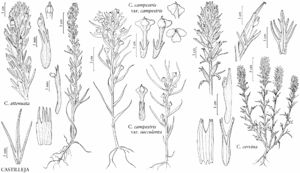Difference between revisions of "Castilleja campestris var. campestris"
IllustratedEndemic
FNA>Volume Importer |
imported>Volume Importer |
||
| (3 intermediate revisions by 2 users not shown) | |||
| Line 1: | Line 1: | ||
{{Treatment/ID | {{Treatment/ID | ||
|accepted_name=Castilleja campestris var. campestris | |accepted_name=Castilleja campestris var. campestris | ||
| − | |accepted_authority= | + | |accepted_authority= |
|publications= | |publications= | ||
|special_status={{Treatment/ID/Special_status | |special_status={{Treatment/ID/Special_status | ||
|code=F | |code=F | ||
| − | |label= | + | |label=Illustrated |
}}{{Treatment/ID/Special_status | }}{{Treatment/ID/Special_status | ||
|code=E | |code=E | ||
| Line 35: | Line 35: | ||
-->{{#Taxon: | -->{{#Taxon: | ||
name=Castilleja campestris var. campestris | name=Castilleja campestris var. campestris | ||
| − | + | |authority= | |
| − | |authority= | ||
|rank=variety | |rank=variety | ||
|parent rank=species | |parent rank=species | ||
| Line 49: | Line 48: | ||
|publication title= | |publication title= | ||
|publication year= | |publication year= | ||
| − | |special status= | + | |special status=Illustrated;Endemic |
| − | |source xml=https:// | + | |source xml=https://bitbucket.org/aafc-mbb/fna-data-curation/src/2e0870ddd59836b60bcf96646a41e87ea5a5943a/coarse_grained_fna_xml/V17/V17_1037.xml |
|genus=Castilleja | |genus=Castilleja | ||
|species=Castilleja campestris | |species=Castilleja campestris | ||
Latest revision as of 19:24, 5 November 2020
Herbs (0.3–)1–3 dm. Leaves linear, thin, flexible, 0.8–4 cm. Inflorescences: bracts linear, shorter than or ± equal to flowers. Calyces 7–11 mm; abaxial and adaxial clefts 3–6 mm, 45–75% of calyx length. Corollas light to bright yellow, 14–26 mm; tube 13–22 mm. Anthers: proximal pollen sac to 1/3 length of distal.
Phenology: Flowering (Mar–)Apr–Jul(–Aug).
Habitat: Vernal pools, moist ground.
Elevation: 0–2100 m.
Discussion
Variety campestris is widespread from central California to east-central Oregon, but much of its vernal pool and wet meadow habitat has been lost to agricultural development.
Selected References
None.
Lower Taxa
None.
